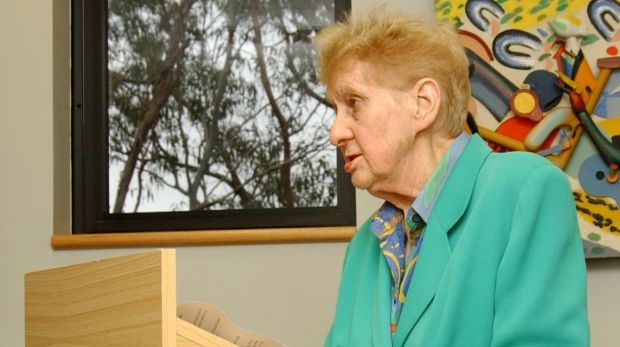
Ruth Duckett, pioneer female pharmacist.
RUTH DUCKETT 1919-2015
Ruth Duckett was a leader in her profession at the time when married women stayed at home. As was common in the post-war years, she left work to raise her children but, as was uncommon, went back into the workforce as a hospital pharmacist in the early 1960s, first as deputy chief pharmacist at Prince Henry Hospital then as chief pharmacist at North Ryde Psychiatric Centre.
Ruth Wilson was born on February 5, 1919, in Melbourne, the second youngest of 13 children to Richard Wilson and his wife, Anne (nee Ogilvie). Her formative years were spent in the family’s sprawling house in Essendon but both parents died before Ruth was out of her teens and she was then raised by her grandmother. Spending time in the gardens of the family home instilled in her a life-long love of flowers and gardens.
The Wilsons were a talented family with, unusually for the time, all the children, including the girls, encouraged to pursue post-secondary education and professional careers. Ruth went to Firbank Grammar, allegedly choosing it because it was the furthest school from home and she didn’t want to have the examples of her older siblings in the consciousness of teachers.
She then enrolled at the Victorian pharmacy college and was apprenticed to a leading pharmacist Alexander McGibbony (then president of the Pharmacy Guild). During the war she remembered stopping traffic in Melbourne on a significant sporting day as part of a simulated gas attack.
It was during those war years that she met Alan Duckett from Sydney, who had been billeted by the army where she lived in Tasma Terrace, near the Victorian parliament. They went on mushrooming excursions to Heidelberg and other rural places to supplement ration food in the collective kitchen and were married in 1946.
After the war, the Ducketts moved to Sydney, where Ruth worked as a pharmacist before her children were born then went back to work. At North Ryde she mentored generations of pharmacy students and taught pharmacology to nursing students, staying up into the night poring over reference books to write her lectures. She introduced many pharmacy innovations, including “ward pharmacy” (pharmacists actually visiting the wards to review medication charts and drugs) to the psychiatric system and was a ferocious advocate of keeping up-to-date with the rapid developments in psychotropic medications occurring at that time.
Duckett was also active in professional organisations. She was chairwoman of the state branch of the Society of Hospital Pharmacists for a number of years and worked with the University of Sydney to improve the preparation of students planning a career in hospital pharmacy. She was also chairwoman of the NSW branch of the Association of Gerontology.
Following her retirement in 1979, Duckett enrolled in an arts degree at Macquarie University, graduating with honours in history and politics. She became active in student politics and among other roles, was elected student representative on the University Council, where she was a passionate advocate for students and their rights. True to form, she mentored many much-younger students on life and politics.
After graduation, Duckett became active in the Macquarie Alumni Association, serving as president, and was elected for a number of terms by the graduate body as a member of University Council. She was an excellent campaigner and her ticket was invariably successful. She was awarded an honorary doctorate by the university, in recognition of her many years of service, as part of its 50th anniversary celebrations. She was also an assiduous letter writer for Amnesty International’s campaigns.
After Alan’s death in 1985, Ruth remained in the family home in Lindfield, enjoying its garden, which she had created, and was proud of the fact that they had paid it off after years of financial struggle.
She remained young thinking and alert through her extensive contacts with the people she had mentored. She was supported at home by a team of carers right to the end, spending only a few days in hospital before her death.
Ruth Duckett is survived by children Margaret, Stephen and Mary and grand-children Sarah, Dylan and Cameron.
Stephen Duckett
